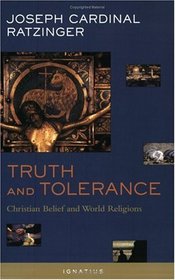Ever hear someone say, "It doesn't matter what you believe, all that matters is that you are a good person"? I assume you have. If you are interested in the intellectual-historical development of this phrase, read this book.
Here, Pope Benedict XVI does not so much argue for the Truth of Christianity here, as he does argues for the capacity of the human mind. It is a call for a return to original spirit of Philosophy as inspired by Plato: that man can know Truth. Wielding his vast theological, philosophical, and historical erudition, he makes a compelling case that the primary problem facing this age is the notion that reason, and hence truth, is limited to what is quantifiable, i.e., to what science alone can tell us. From such an understanding has stemmed the worldview that what belongs in the realm of the objective is the empirical, the testable, the scientific; while what belongs in realm of the subjective is the sentimental, the emotional, and the aesthetic. As such, truth and reason are relegated to the realm of the empirical; it has no say in questions of value, beauty, and religion--truth cannot be predicated of such areas.
Using this as a hermeneutic key to unlock the problems facing belief today, Pope Benedict XVI spends the majority of the book working to implode this mindset from the inside and expand the scope of truth and reason to once again encapsulate all of human existence. Of particular interest is the way in which he shows:
a.) how the rise of eastern mysticism in the west and the the predominance of pluralistic theologians such as John Hick depends particularly on the assumption that reason has no say in questions of religion,
b.) how Newton, Francis Bacon, and natural science actually presupposes the Platonic notion of reason that he [Pope Benedict XVI] argues for,
c.) how Truth and Goodness are necessarily related to each other, AND
d.) how the Mosaic Distinction of Truth and falsity (think of the 1st commandment) in the realm of religion has a historical parallel in the Greek philosophy via Socratic dialectic (Plato's Euthyphro) and how both were synthesized in the Patristic era (Augustine's City of God).
This book is excellent. Though I cannot always agree with the arguments, and a word of warning for the reader: it is not easy âentertainment 101â reading. (Theoretical, philosophical, and abstract reasoning is required) it is fascinating read!
Here, Pope Benedict XVI does not so much argue for the Truth of Christianity here, as he does argues for the capacity of the human mind. It is a call for a return to original spirit of Philosophy as inspired by Plato: that man can know Truth. Wielding his vast theological, philosophical, and historical erudition, he makes a compelling case that the primary problem facing this age is the notion that reason, and hence truth, is limited to what is quantifiable, i.e., to what science alone can tell us. From such an understanding has stemmed the worldview that what belongs in the realm of the objective is the empirical, the testable, the scientific; while what belongs in realm of the subjective is the sentimental, the emotional, and the aesthetic. As such, truth and reason are relegated to the realm of the empirical; it has no say in questions of value, beauty, and religion--truth cannot be predicated of such areas.
Using this as a hermeneutic key to unlock the problems facing belief today, Pope Benedict XVI spends the majority of the book working to implode this mindset from the inside and expand the scope of truth and reason to once again encapsulate all of human existence. Of particular interest is the way in which he shows:
a.) how the rise of eastern mysticism in the west and the the predominance of pluralistic theologians such as John Hick depends particularly on the assumption that reason has no say in questions of religion,
b.) how Newton, Francis Bacon, and natural science actually presupposes the Platonic notion of reason that he [Pope Benedict XVI] argues for,
c.) how Truth and Goodness are necessarily related to each other, AND
d.) how the Mosaic Distinction of Truth and falsity (think of the 1st commandment) in the realm of religion has a historical parallel in the Greek philosophy via Socratic dialectic (Plato's Euthyphro) and how both were synthesized in the Patristic era (Augustine's City of God).
This book is excellent. Though I cannot always agree with the arguments, and a word of warning for the reader: it is not easy âentertainment 101â reading. (Theoretical, philosophical, and abstract reasoning is required) it is fascinating read!




